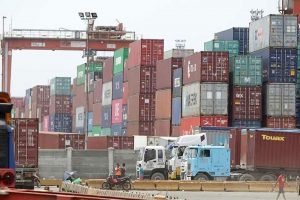
‘Ambitious’ PEDP goals to be adjusted on weak global growth
By Justine Irish D. Tabile, Reporter
THE TARGETS set in the Philippine Export Development Plan (PEDP) may have to be tempered to reflect slower global economic growth, according to the Department of Trade and Industry.
Bianca Pearl R. Sykimte, director of the Export Marketing Bureau and executive director of the Export Development Council, said that the PEDP export targets will be subject to “recalibration.”
“We will, but timing-wise, we are not yet able to explore the recalibration of targets. But we had discussions already, and we are only waiting for the timing,” Ms. Sykimte told reporters on the sidelines of the Auto Parts and Vehicles Expo on Wednesday.
“We might temper them because when we were drafting the PEDP, at the time we were recovering from the pandemic, there was an upward trend,” she said, adding that the need for them to be toned down became apparent with inflation, the geopolitical crisis, and slower global economic growth.
She said however that export targets set out in the Philippine Development Plan (PDP) remain achievable.
“We issued the PDP first, which is why its targets were more tempered. In fact, in terms of PDP targets, we are actually hitting them,” she said.
“The PEDP is really intended to be more ambitious,” she added. “But the scenario that we were expecting at the time we were drafting the PEDP was more favorable.”
Last year, total exports of $103.6 billion missed the $126.8 billion goal laid down in the PEDP but surpassed the $100.9 billion set under the PDP.
The PEDP expects merchandise and services exports for 2024 to hit $143.4 billion, a much more aggressive estimate than the $107-billion export target under the PDP.
The Philippine Statistics Authority reported that exports of goods in the first quarter amounted to $17.98 billion, up 4.8% from a year earlier.
Ms. Sykimte said that although the semiconductor industry, which accounts for the majority of exports, is expected to recover this year, the performance of agricultural exports will hinge on international prices.
“Luckily for semiconductors, we’re expecting an uptick this year. But of course, we also have a big agricultural resource base that is dependent on international prices,” she said.
“For copper, international prices are decreasing, and for coconut, we’re looking at what will be the trend for the year because these are the driving export figures for resource-based export products,” she added.



